Accelerated BSN programs with high acceptance rates can help you quickly acquire nursing skills and expertise.
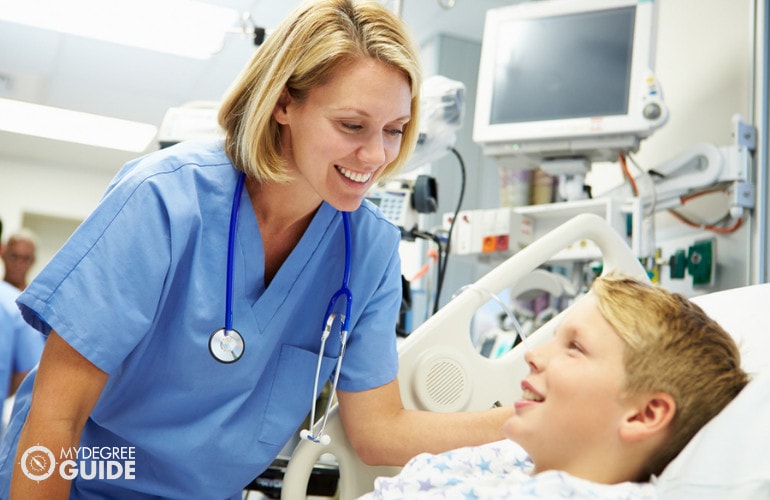
If you have a bachelor’s degree and are ready for a career change, an ABSN program could provide the training that you need.
Editorial Listing ShortCode:
Nursing is a growing profession, and you’ll complete this training with in-demand skills for the healthcare workforce. If you have the right qualifications, online accelerated BSN programs can provide a quick path toward a nursing degree and registered nurse licensure.
Universities Offering Online Accelerated Bachelor of Science in Nursing Degree Programs With High Acceptance Rates
Methodology: The following school list is in alphabetical order. To be included, a college or university must be regionally accredited and offer degree programs online or in a hybrid format.
Indian River State College
Indian River State College offers a Registered Nurse to Bachelor of Science in Nursing program. The program allows students to graduate after obtaining 121 credit hours.
As of 2021, the school has a 100% acceptance rate, but the B.S.N. program requires students to have a registered nursing license, an associate degree in nursing, and a GPA of 2.5 or higher.
Indian River State College is accredited by the Southern Association of Colleges and Schools Commission on Colleges
Lamar University
Lamar University offers a Registered Nurse to Bachelor of Science in Nursing degree program. The program can be completed online and requires 30 credit hours. Applicants must be registered nurses with a GPA of 2.5 or higher. As of 2021, the school’s acceptance rate is 88.3%.
Lamar University is accredited by the Southern Association of Colleges and Schools Commission on Colleges.
Metropolitan State University
Metropolitan State University offers an accelerated Bachelor of Science in Nursing program for those who are already registered nurses.
The program, which has a 96.7% acceptance rate as of 2021, can be taken online or through a hybrid learning structure. Applicants must have a GPA of 2.5 or higher and must complete an official degree plan with an academic advisor.
Metropolitan State University is accredited by the Higher Learning Commission.
Missouri Southern State University
Missouri Southern State University offers a Bachelor of Science in Nursing program with a 96.2% acceptance rate as of 2021. The program requires the completion of 120 credit hours.
Students have the option to enter an accelerated program if they meet the requirements. These requirements include being a registered nurse, having an associate’s degree in nursing, and finishing NURS 0301 with a grade of C or higher.
MSSU is accredited by the Higher Learning Commission.
Nicholls State University
Nicholls State University offers a Bachelor of Science in Nursing program with a 92% acceptance rate as of 2021.
Students who have obtained either an LPN or an RN certificate may be able to transfer credits from previous coursework completed. Admission requirements vary depending on if applicants have an LPN, an RN, or no prior certificate, but all require a GPA higher than 2.0.
Nicholls State University is accredited by the Southern Association of Colleges and Schools Commission on Colleges.
North Dakota State University
North Dakota State University offers an online Registered Nurse to Bachelor of Science program with an admissions rate of 83.5% as of 2021. Courses are 8 weeks long, which means the program can potentially be completed in 5 semesters. Applicants must have a GPA of 2.75 or higher and have an associate’s degree.
NDSU is accredited by the Higher Learning Commission.
South Dakota State University
South Dakota State University offers a Registered Nurse to Bachelor of Science program with a 92% admissions acceptance rate as of 2021. Courses are 7 weeks long and can be completed online. A total of 30 credit hours are required to graduate. Applicants must have an associate’s degree and be registered nurses to be eligible.
South Dakota State University is accredited by the Higher Learning Commission.
Southeast Missouri State University
Southeast Missouri State University offers a Registered Nurse to Bachelor of Science program.
The program is offered online and requires 20 courses to graduate. To be admitted to the program, applicants must submit all official transcripts, have a GPA of 2.5, and be registered nurses with an associate’s degree. As of 2021, the school has a 97.2% acceptance rate.
Southeast Missouri State University is accredited by the Higher Learning Commission.
Tennessee Technological University
Tennessee Technological University offers a Registered Nurse to Bachelor of Science in Nursing degree program.
A curriculum is created for each person accepted into the program based on their past experiences. Those interested in the program must submit an online application with a statement of purpose. As of 2021, the program has a 97.5% acceptance rate.
Tennessee Technological University is accredited by the Southern Association of Colleges and Schools Commission on Colleges.
University of Kansas
The University of Kansas offers a Registered Nurse to Bachelor of Science in Nursing program with a 92.3% acceptance rate as of 2021. When studying full-time, students can typically complete the program in 1 year. Applicants must have a GPA of 2.5 or higher, be registered nurses, and submit 3 letters of reference.
The University of Kansas is accredited by the Higher Learning Commission.
University of Louisiana – Monroe
The University of Louisiana—Monroe offers a Registered Nurse to Bachelor of Science in Nursing program. Students must complete 30 credit hours and a final capstone course to graduate. As of 2021, the program has a 91% acceptance rate and requires applicants to be registered nurses and have a GPA of 2.0 or higher.
The University of Louisiana Monroe is accredited by the Southern Association of Colleges and Schools Commission on Colleges.
University of Missouri
The University of Missouri offers a Registered Nurse to Bachelor of Science in Nursing online program with an 81.5% acceptance rate as of 2021. The program is designed to allow students who already have experience in nursing to receive a B.S.N. in only 26 credits. Applicants must have a GPA of 2.5 or higher and be registered nurses.
The University of Missouri is accredited by the Higher Learning Commission.
University of Nevada – Las Vegas
The University of Nevada—Las Vegas offers an online Bachelor of Science with the option to take the Accelerated Second Degree track or the RN – BSN Track.
Both tracks require students to complete 86 credits. As of 2021, the school has an 88% acceptance rate. The accelerated track requires students to have either a certificate or be registered nurses.
UNLV is accredited by the Northwest Commission on Colleges and Universities.
University of Northern Colorado
The University of Northern Colorado offers a Registered Nurse to Bachelor of Science in Nursing online program. It allows students to complete a practicum in their area. The program has an acceptance rate of 89% as of 2021 and is designed for those who are currently working as registered nurses.
The University of Northern Colorado is accredited by the Higher Learning Commission.
University of Texas – El Paso
The University of Texas—El Paso offers a Registered Nurse to Bachelor of Science in Nursing online degree program with a 99.8% admissions rate as of 2021.
The program requires students to complete the University Core Curriculum and 2.5 semesters’ worth of nursing credits. Applicants must be registered nurses and have a GPA of 2.0 or higher.
The University of Texas at El Paso is accredited by the Southern Association of Colleges and Schools Commission on Colleges.
University of Utah
The University of Utah offers a Registered Nurse to Bachelor of Science in Nursing online program. It can typically be completed in 2 to 4 semesters depending on the student’s schedule. Applicants must have an associate degree in nursing and be a licensed RN. As of 2021, the school has an 82.6% acceptance rate.
The University of Utah is accredited by the Northwest Commission on Colleges and Universities.
Washburn University
Washburn University offers a Registered Nurse to Bachelor of Science in Nursing online program with an acceptance rate of 95.5% as of 2021. Each course is 8 weeks long, which typically allows students to complete the part-time program in 18 months. Applicants must have a GPA of 2.5 or higher and must be registered nurses.
Washburn University is accredited by the Higher Learning Commission.
Weber State University
Weber State University offers a Registered Nurse to Bachelor of Science in Nursing program. The program can typically be completed in 2 to 3 semesters.
Students with 5+ years of experience may be able to gain extra credits. As of 2021, the school has a 100% acceptance rate for applicants with a GPA of 3.0 or higher and an Associate of Applied Science.
Weber State University is the Northwest Commission on Colleges and Universities.
West Virginia University
West Virginia University has a Registered Nurse to Bachelor of Science in Nursing program with an acceptance rate of 85.1% as of 2021. Students need to complete 10 courses to graduate. Applicants must be registered nurses and need to have a GPA of 2.0 or higher and 24 transferable credits.
West Virginia University is accredited by the Higher Learning Commission.
Youngstown State University
Youngstown State University offers a Registered Nurse to Bachelor of Science in Nursing online program. Students must complete 122 credit hours to graduate. As of 2021, the school has an 86.7% acceptance rate. Applicants must be registered nurses, have an associate’s degree with a GPA of 2.0 or higher, and submit official transcripts.
Youngstown State University is accredited by the Higher Learning Commission.
Online Accelerated BSN Programs with High Acceptance Rates

Healthcare organizations have a great need for nurses, but not just anyone can fill their open positions. Qualifying to become a nurse requires specialized training and licensure.
You can earn the necessary education by enrolling in accelerated bachelors in nursing programs. Standard bachelor’s degree programs last about 4 years. Accelerated nursing programs can take much less time. Most take 2 years or less. Some can be completed in just 1 year.
Most accelerated bachelors in nursing programs are designed for students who already have a bachelor’s degree in another field. Because students have already completed a general education core and prerequisite science courses, the fast-track BSN curriculum can focus solely on nursing fundamentals.
Many students consider these the easiest nursing programs to get into, though of course you will still need to meet the minimum admission requirements.
In nursing school, you’ll likely study:
- Geriatric care
- Health assessment
- Health education
- Healthcare law
- Nursing research
- Pediatric care
- Public health
In addition to classroom learning, fast track nursing programs online also require clinical experiences. In real-world healthcare settings, you can learn to put your classroom lessons into practice. You can become more adept at patient care, and you can gain experience in how healthcare facilities operate.
These programs usually prepare students for registered nurse (RN) licensure in select states. You won’t automatically be licensed as soon as you graduate, but you’ll likely be qualified to apply with your state’s licensing board and take the NCLEX-RN exam. Once you’re a licensed RN, you can apply for nursing jobs.
According to the Bureau of Labor Statistics, 60% of RNs work in hospitals. Other job settings can include doctor’s offices, surgery centers, home healthcare agencies, schools, public health departments, mental health facilities, and nursing homes.
The nursing field also offers growth potential. For example, there may be opportunities to work in healthcare management. Earning a graduate degree can help qualify you for advanced nursing positions.
How to Choose an Online Accelerated BSN Program

When you’re searching for accelerated nursing programs with high acceptance rates, you’ll find multiple school options. Considering more factors than just acceptance rates can help you decide where to apply. Here are some additional factors to consider:
- Accreditation. In order to qualify for state licensure, your college often needs to be regionally accredited. Also, reputable nursing programs are typically accredited by the Accreditation Commission for Education in Nursing (ACEN) or the Commission on Collegiate Nursing Education (CCNE).
- Licensure. Each state sets its own licensure requirements, so it’s beneficial to make sure that any school you choose will meet your state’s qualifications.
- Location. Online programs are useful for completing coursework, but you’ll still need to complete in-person clinical experiences. For that reason, choosing a nearby program can be beneficial.
- Minimum GPA requirements. Your GPA from your previous college program may determine whether you’re qualified to apply for certain ABSN programs with high acceptance rates.
- Prerequisites. Some ABSN programs expect applicants to already hold a bachelor’s degree. Others accept students who have a minimum number of undergraduate credits as well as certain prerequisite courses.
One factor that may not be as critical is the popularity of the program. Since nursing is an in-demand profession, being a licensed nurse may be all it takes to find a good job—even if you didn’t go to one of the best-known schools.
Nursing Careers & Salaries
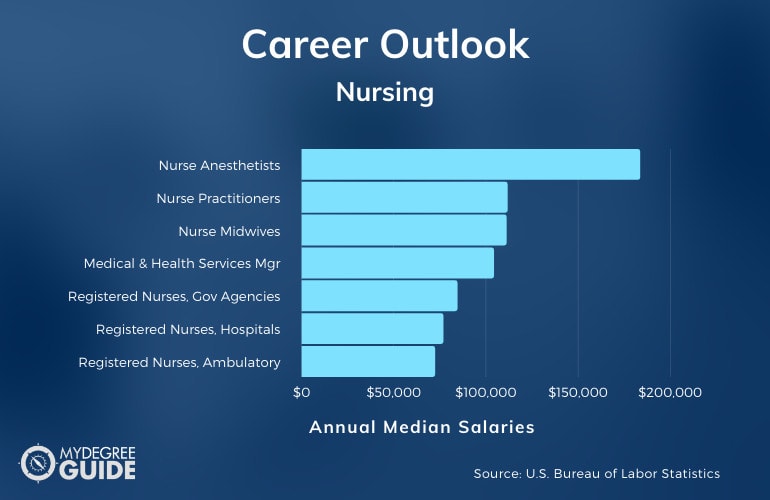
Registered nurses (RNs) find work in many different settings. Healthcare facilities are common places of employment. These include hospitals, doctor’s offices, and outpatient surgery centers.
Nurses can also work in nursing homes or other long-term care facilities. Some go into private homes to provide healthcare for people who need special services. Some nurses work for government agencies. For example, they may work in public health departments or VA facilities.
In addition to providing clinical care, nurses may also become healthcare administrators. They may head up nursing departments or oversee the management of patient data. According to the Bureau of Labor Statistics, healthcare practitioners earn an average annual salary of $69,870.
| Careers | Annual Median Salaries |
| Nurse Anesthetists | $183,580 |
| Nurse Practitioners | $111,680 |
| Nurse Midwives | $111,130 |
| Medical and Health Services Managers | $104,280 |
| Registered Nurses, Government Agencies | $84,490 |
| Registered Nurses, Hospitals | $76,840 |
| Registered Nurses, Ambulatory Healthcare Services | $72,340 |
| Registered Nurses, Nursing and Residential Care Facilities | $68,450 |
| Registered Nurses, Educational Services | $64,630 |
| Licensed Practical and Licensed Vocational Nurses | $48,820 |
Some of these careers require additional education and licensure beyond a BSN and an RN license.
Nurses who are motivated to earn masters or doctoral degrees could qualify to become advanced practice registered nurses (APRNs). Some APRNs specialize in midwifery or anesthesia. Others are nurse practitioners who provide primary care or specialty services.
School nurses provide medical services for students. In elementary and secondary schools, nurses may keep track of students’ medical records, help kids who get hurt or sick in class, and serve as a liaison between home and school. College nurses may provide on-campus medical care and answer students’ health questions.
Accelerated Nursing Curriculum & Courses
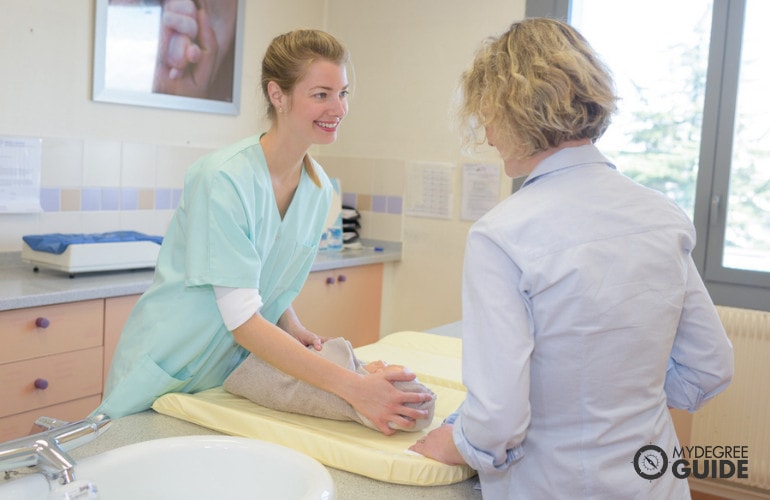
In accelerated nursing programs online, you don’t tend to take general education courses. Instead, the coursework focuses on nursing-specific topics in preparation for providing excellent clinical care.
- Adult Health: Taking this course will help get you ready to provide nursing support in primary care offices, specialty offices, and operating rooms.
- Children’s Healthcare: Your time studying children’s health will teach you to care for the wellbeing of babies, kids, teenagers, and entire families.
- Elder Care: In this class, you’ll study health needs that often arise as people get older, and you’ll also discuss cultural attitudes toward aging.
- Evidence-Based Practice: As you learn about research methods in nursing and healthcare, you’ll gain a better understanding of how evidence-based practices are developed.
- Fundamentals of Nursing Practice: This course provides an overview of nursing careers and professional behavior.
- Healthcare Ethics: In this class, you might discuss general ethics, ethical decision-making for health professionals, and laws related to healthcare practice.
- Maternity Nursing: This class teaches you to assist pregnant women, delivering mothers, and newborn infants.
- Nursing for Mental Health: The curriculum for this course prepares you to care for patients’ mental health as well as their physical wellbeing.
- Nutrition: This course provides an overview of nutrition fundamentals and how you can incorporate guidance about healthy eating into your nursing care.
- Public Health: You’ll learn about health promotion and education so that you can help people make smart healthcare and lifestyle choices.
Accelerated bachelors in nursing programs often require 60 to 75 credit hours. In addition to coursework, credits will also be earned through clinical experiences.
Admissions Requirements

Getting into fast track nursing programs online isn’t quite the same as applying to other bachelor’s degree programs. For this specialized degree, you may need to meet several qualifications.
Common admissions requirements include:
- Bachelor’s degree in any field or minimum number of college credits
- Background check
- Prerequisite courses with a minimum grade of 3.0
- Resume listing professional experience
Each school sets its own admissions standards, so it’s beneficial to read guidelines carefully before submitting application materials.
Accreditation
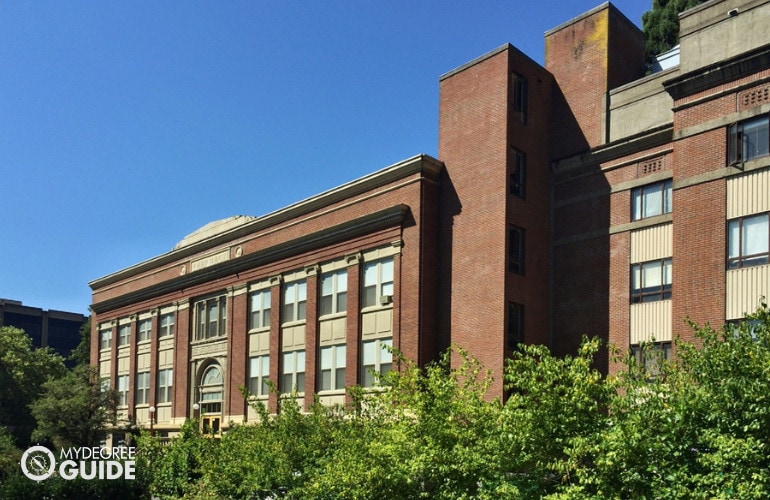
Sitting for the NCLEX RN exam is an essential step in becoming a licensed nurse. To qualify for the test, you may need to have earned your nursing education from a regionally accredited college. The rules vary from state to state, but it’s helpful to keep in mind as you search for a fast-track nursing program.
The NCLEX isn’t the only reason to opt for a regionally accredited college. Courses taken from accredited schools may transfer elsewhere. An accredited bachelor’s degree may also help you get into a nursing master’s program. In addition, employers may check whether you have studied at an accredited school.
Financial Aid and Scholarships

If you’d like help paying for a nursing degree, you can fill out the Free Application for Federal Student Aid (FAFSA). Your FAFSA results will determine what sort of government assistance you can receive.
The two main forms of student aid from the federal government are grants and loans. Grants are free tuition money, but loans have to be repaid with interest. In addition to federal aid, you might also qualify to receive assistance from your state.
Scholarships are similar to grants because they don’t have to be repaid. You can apply for scholarships from nursing organizations, charitable groups, and memorial funds. Colleges sometimes have scholarship opportunities as well.
Some students receive workplace funding. If you’re leaving your current line of work to pursue nursing, that might not be an option for you. Just in case, though, it might be worth looking into.
What Is an ABSN Program?

An Accelerated Bachelor of Science in Nursing (ABSN) program is a quick approach to getting a nursing degree for people who have already been to college. If you have a bachelor’s degree in any field, you may qualify to enter an ABSN program.
Going through an ABSN program is like completing the junior and senior years of a degree program. The classes that you take will all center around nursing topics. You’ll have lecture courses as well as clinical rotations. Within 2 years, you may earn a second bachelor’s degree. You may also qualify for RN licensure in your state.
Who Is the Accelerated BSN Program For?

The top candidates for ABSN programs are college graduates who want to break into the nursing profession.
In general, accelerated BSNs are designed for people who hold bachelor’s degrees. Typically, that degree can come from any field. In some cases, schools will accept a certain number of credits, provided they include certain prerequisites, in lieu of a full degree.
ABSN programs can be intense, so they’re often intended for those who have a proven track record of being organized and doing well in college. It’s common for nursing programs to set a minimum GPA of 3.0 for applicants.
What Is the Easiest Accelerated Nursing Program to Get Into?
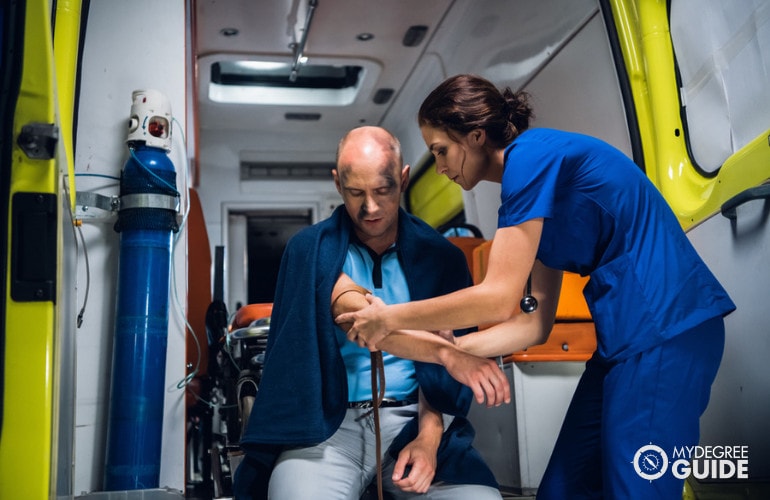
The easiest nursing programs for you to get into will be the ones that you’re most qualified for. You’ll have an easier time having your application approved if you’ve taken the right prerequisites and met the minimum GPA.
You can also look for schools with regional accreditation as well as a course and clinicals schedule that meshes with your availability. You can consider program length, too. Two-year programs may take longer than others, but they may help you maintain a less intense schedule.
How Competitive Are Accelerated BSN Programs?
There’s a definite need for nurses in the workforce, but even still, the nursing school acceptance rate at some institutions is rather low. Colleges have the capacity to accommodate only a set number of students, so they often have to be choosy.
Schools with larger faculties or greater classroom space—including online platforms—can typically take more students. Multiple start dates throughout the year may increase your chances of getting into a particular program as well.
To help your application stand out, you can proofread your materials, ask for stellar professional recommendations, and turn everything in on time.
What Can I Do with a BSN?
A Bachelor of Science in Nursing (BSN) is an undergraduate degree that prepares students to become registered nurses (RNs) after meeting state licensure requirements. According to the Bureau of Labor Statistics, RNs earn a median annual salary of $75,330.
Hospitals are common workplaces for RNs. Others get jobs in doctor’s offices, public health departments, and schools. There may be additional opportunities in group homes, correctional facilities, and mental health organizations.
Nurses may also work as medical managers to coordinate nursing teams or implement quality-management strategies. Having a BSN can help qualify nurses to enroll in Master of Science in Nursing (MSN) programs.
How Long Is an Accelerated BSN Program?
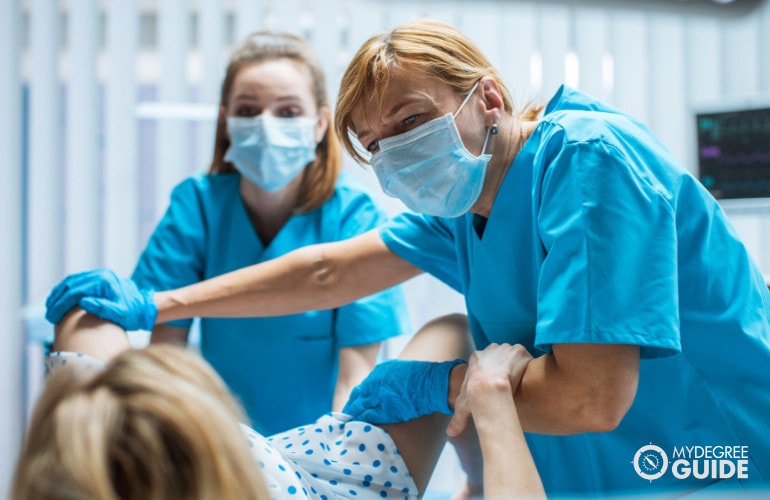
Most accelerated bachelors in nursing programs last 1 to 2 years. For an accelerated BSN, you’ll generally need to earn 75 credits or fewer. Most nursing students can complete the requirements, including both coursework and clinical experiences, within a maximum of 2 years.
Some ABSN programs are intended to be even shorter. At schools with short-format online classes, you might be able to graduate with a nursing bachelors degree in just 11 to 16 months.
What’s the Cost of Accelerated Nursing Programs?
The cost of an accelerated BSN program varies from school to school, but many accelerated BSN programs cost between $200 and $850 per credit hour.
Your overall tuition will depend not only on your cost per credit hour but also on how many credits you’re required to take. These programs often consist of 60 credits to 75 credits. Additional semester and program fees factor into the total cost as well.
What’s the Difference Between ABSN vs. BSN?

Some students enter the nursing profession with accelerated Bachelor of Science in Nursing (ABSN) degrees. Others go the more traditional route and earn a standard Bachelor of Science in Nursing (BSN).
Here are some ways the two degree tracks compare:
| ABSN | BSN |
|
|
While the entrance requirements and format for these two programs differ, either one may help you qualify for nursing licensure.
What’s the Difference Between an Accelerated BSN vs. Direct Entry MSN?
There are two popular options for transitioning into the field of nursing from a different career. Some choose to get an accelerated Bachelor of Science in Nursing (ABSN). Others go for a direct-entry Master of Science in Nursing (MSN).
Here’s how they stack up:
| ABSN | Direct-Entry MSN |
|
|
Both of these degrees are designed for people who are new to the nursing field. A growing number of universities even offer direct entry MSN programs without GRE required.
Is an Accelerated BSN Worth It?

Yes, an accelerated BSN program is worth it for many professionals. Because nurses’ work contributes to people’s health and wellness, nursing is a field that’s always needed.
Nurses can help people in some of their happiest moments as well as some of their hardest times. According to the Bureau of Labor Statistics, nursing is a growing profession. The growth estimate for RN positions is 7% over the next decade.
Getting a BSN could also help qualify you for master’s degree studies someday. With an MSN, you could prepare to earn certification as an advanced practice nurse. Advanced practice nursing roles are growing at a 45% rate.
Getting Your Accelerated BSN Online

It’s not too late to change careers, and an Accelerated Bachelor of Science in Nursing could help you quickly prepare to enter a new field. With this program, you can build on your prior college studies and graduate with a bachelors in nursing in 2 years or less.
When you’re on the search for nursing schools with high acceptance rates, you may want to check out online programs. Online coursework can be flexible and convenient. With an online program from an accredited school, you can count on receiving a quality nursing education that will help you get ready for your new career.
You can start exploring your options for online ABSN programs today!
